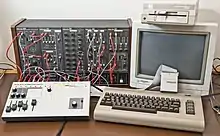Roland System-100M
The Roland System-100M was a semi-modular analog synthesizer manufactured by the Roland Corporation in the early 1980s. It was the successor of the Roland System-100, a semi-modular keyboard.
| System-100M | |
|---|---|
 A Roland System-100M (top left) controlled by a Commodore 64 | |
| Manufacturer | Roland Corporation |
| Dates | 1979-c.1984[1] |
| Price | £1242 for 5-module system with monophonic keyboard[1] |
| Technical specifications | |
| Polyphony | Depends on chosen modules. Usually monophonic or 4-voice polyphonic. |
| Oscillator | Each VCO has triangle, falling sawtooth, and pulse output (110, 112 modules) |
| LFO | Each voltage-controlled LFO has sine, triangle, square, rising sawtooth, and falling sawtooth output (140, 150 modules); the manually set LFO has triangle output only (172 module) |
| Synthesis type | Analog subtractive |
| Filter | low-pass (110, 121 modules) |
| Effects | Phase shifter and BBD-based audio delay available (172 module) |
| Input/output | |
| Keyboard | 32 keys, monophonic (180 keyboard); 49 keys, monophonic (181 keyboard); 49 keys, 4-voice polyphonic (184 keyboard) |
| Left-hand control | Pitch bend (181 and 184 keyboards only); portamento on/off (181 only); automated arpeggio (184 only) |
In the 1980s, shortly after its introduction, Richard Burgess of Landscape called the 100M "one of the best synthesisers on the market, with so many control functions available independently, whereas most synths only have one or two LFOs to do all the modulating."[2] Ian Boddy considered the System 100M "an almost ideal introduction to the world of modular synthesis,"[3] and praised its oscillator sync sound, especially when sampled to fake analog modular polyphony.[4]
By the 1990s, although digital synthesizers were starting to replace analog ones, several prominent musicians still enthused about their 100Ms. Jack Dangers of Meat Beat Manifesto said "the best thing about it is that it's modular and it uses a patchbay, so you can send things back on themselves and get, like, analogue feedback, you really can... You can do cross-modulation, too. It's pretty good for external sound sources, as well."[5] Chris Carter called it "as versatile, expandable, and affordable a system as you can get without going the DIY route."[6]
Components
| Model | Type | Released[7] | Description |
|---|---|---|---|
| 110 | Module | 1979 | VCO/VCF/VCA |
| 111 | Module | Prototype | VCO / VCF |
| 112 | Module | 1979 | Dual VCOs |
| 120 | Module | Prototype | VCF / VCA |
| 121 | Module | 1979 | Dual VCFs |
| 130 | Module | 1979 | Dual VCAs |
| 131 | Module | 1980 | Output Mixer / Tuning Oscillator / Headphone Amp |
| 132 | Module | 1980 | Dual CV / Audio Mixers & Voltage Processors |
| 140 | Module | 1979 | Dual ADSR Envelope Generators & LFO |
| 141 | Module | Prototype | Dual Envelope / Gate Delay / Inverter-Adder |
| 150 | Module | 1979 | Ring Mod / Noise / S&H / LFO |
| 160 | Module | Prototype | Computer Interface |
| 165 | Module | 1983 | Dual Portamento Controller |
| 170 | Module | Prototype | Pitch to Voltage converter / Envelope Follower / Amp |
| 172 | Module | 1980 | Phase Shifter / Audio Delay / Gate Delay (with LFO) |
| 173 | Module | 1983 | Signal Gate & Multiple Jacks |
| 174 | Module | 1983 | Parametric EQ |
| 180 | Keyboard | 19?? | 32-key Controller Keyboard |
| 181 | Keyboard | 19?? | 49-key Controller Keyboard |
| 182 | Module | 1980 | Analog Sequencer |
| 184 | Keyboard | 19?? | 49-key 4-note Polyphonic Controller Keyboard |
| 190 | Rack | 19?? | Three-Module Rack |
| 191-J | Rack | 19?? | Five-Module Rack |
2020 Clones
The original Roland schematics being fully available online, Behringer has planned[8] respective released their own versions (either straight copies or adaptions) of the Roland 100M series of modules in Eurorack format. As of July 2020, the following modules are available for (pre-)ordering:[9]
- 110 VCO/VCF/VCA
- 112 Dual VCO
- 121 Dual VCF
- 130 Dual VCA
- 140 Dual Envelope/LFO
- 150 Ring Mod/Noise/S&H/LFO
- 172 Phase Shifter/Delay/LFO
- 173 Quad Gate/Multiples
- 182 Sequencer
- 297 Dual Portamento/CV Utilities (combination of 132 Dual CV / Audio Mixers & Voltage Processors & 165 Dual Portamento Controller)
- 305 EQ/Mixer/Output (combination of 131 Output Mixer / Tuning Oscillator / Headphone Amp & 174 Parametric EQ)
References
- Forrest, Peter (March 2003). The A-Z of Analogue Synthesisers, Part Two: N-Z, Revised and Expanded. pp. 137–139. ISBN 0-952437-73-2.
- Beecher, Mike (Nov 1981). "Landscape Explored". Electronics & Music Maker. United Kingdom: Music Maker Publications (UK), Future Publishing. pp. 6–10. Retrieved 2020-12-05.
- Boddy, Ian (Mar 1984). "Roland System 100M". Electronics & Music Maker. United Kingdom: Music Maker Publications (UK), Future Publishing. pp. 80–82. Retrieved 2020-12-05.
- Gilby, Paul (Dec 1986). "Ian Boddy: Phoenix". Sound On Sound. United Kingdom. pp. 37–41. Retrieved 2020-12-05.
- Ward, Phil (May 1993). "Message In A Sample". Music Technology. United Kingdom: Music Maker Publications (UK), Future Publishing. pp. 36–42. Retrieved 2020-12-05.
- Carter, Chris (April 1995). "Roland System 100M". Sound On Sound. United Kingdom. Archived from the original on 2015-06-07. Retrieved 2020-01-24.
- Reid, Gordon (December 2004). "The History Of Roland: Part 2: 1979-1985". Sound On Sound. United Kingdom. Retrieved 2020-07-06.
- https://www.musicradar.com/news/namm-2020-behringer-brings-back-rolands-system-100m-modular-synth-in-eurorack-format
- https://www.thomann.de/de/behringer_modulare_systeme.html
